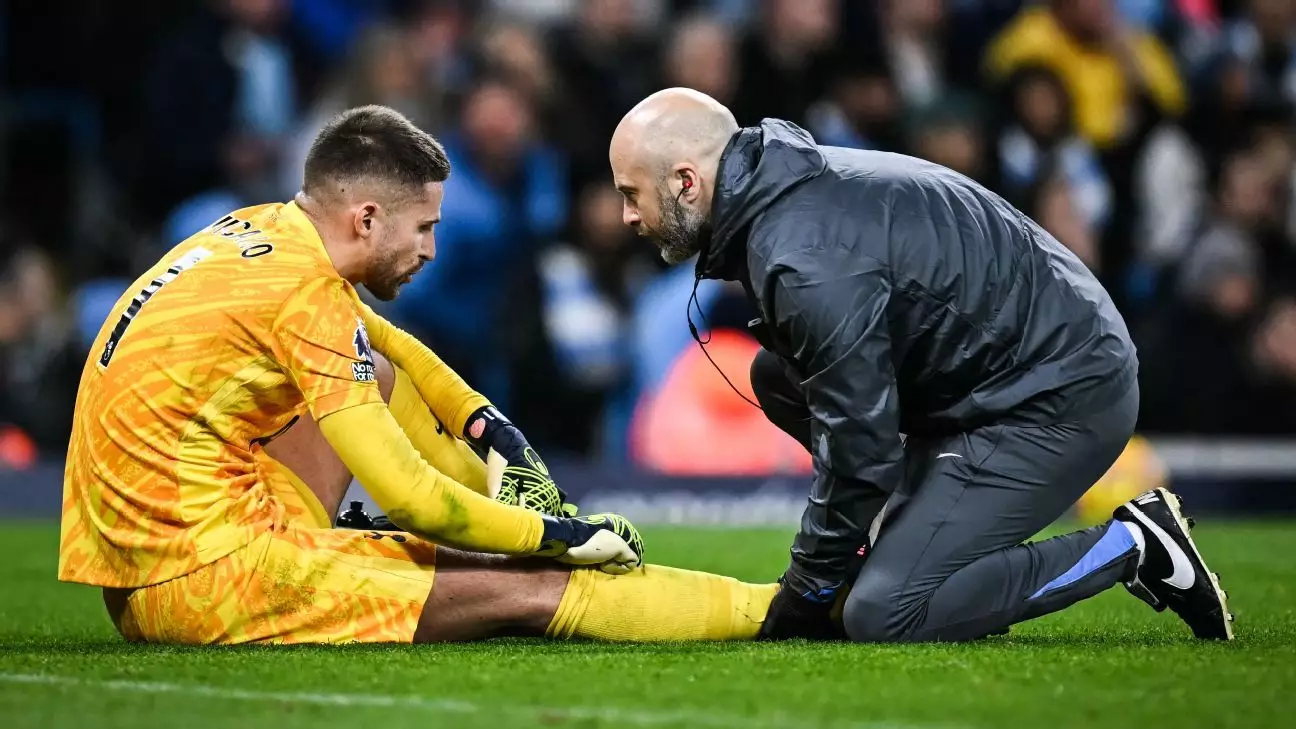Ange Postecoglou’s recent revelation regarding Guglielmo Vicario’s injury has unveiled not just the personal fortitude of the goalkeeper but also how it underlines the challenges faced by Tottenham Hotspur during this season. In a commanding 4-0 win over Manchester City, an incident involving Vicario led to a significant ankle fracture, leaving players, fans, and officials shocked. Postecoglou’s reflections on this situation serve as a poignant reminder of the rigorous demands placed on modern athletes and the unpredictable nature of professional sports.
The injury occurred in an encounter where Vicario was inadvertently hurt during a collision with City’s Savinho. The concerning aspect of this incident is not just the injury itself but the goalkeeper’s sheer will to continue playing despite the pain. He managed to endure the full 90 minutes, contributing vital saves that stifled Guardiola’s side’s attempts to mount a comeback. Postecoglou expressed genuine surprise at the revelation of the fracture, illustrating the powerful narrative hidden within this scenario: the remarkable toughness required to perform at such a high level amidst physical adversity.
Vicario’s mental and physical resilience stands as a stark contrast to the growing discourse around player welfare, especially in an era increasingly focused on athletes’ mental health and well-being. His ability to push through pain showcases a commendable—yet potentially troubling—adherence to ideas about ‘playing through the pain,’ raising questions about the ongoing balance between competitive spirit and player safety.
With Vicario set to be sidelined for an undetermined length of time, potentially months rather than weeks, Tottenham faces a vital period both in terms of performance and squad cohesion. Although Fraser Forster is equipped and ready to step in as the starting goalkeeper, the absence of Vicario—who had been increasingly establishing himself as both a reliable keeper and a burgeoning leader—can disrupt team dynamics and rhythm.
Postecoglou’s acknowledgment of the loss emphasizes the depth of the setback for the club. Vicario had been instrumental in not just saving goals but also maintaining morale amongst the squad and showing leadership on the pitch. His injury underscores the difficulties the team could face moving forward, particularly as they vie for critical standings in both domestic and European competitions.
In the wake of Vicario’s injury, Postecoglou indicated an openness to navigate through this challenge without seeking immediate replacements, prioritizing the internal resources at his disposal. The decision to rely on Forster, who brings a wealth of experience to the position, conveys a sense of trust in the existing squad’s capabilities. But there lies a broader strategic question—how adaptable can Tottenham be in their approach when faced with the absence of key players?
As Tottenham prepares for an upcoming clash against AS Roma, a team undergoing its own managerial transition under the guidance of Claudio Ranieri, these dynamics will be crucial. Postecoglou’s respect for Ranieri reflects a camaraderie among managers who understand the weight of their responsibilities. Despite challenges, Ranieri’s longevity speaks volumes about passion and resilience in football management, comparable to the qualities showcased by Vicario on the field.
Ultimately, Guglielmo Vicario’s injury serves as a powerful narrative within Tottenham’s ongoing campaign. It encapsulates the raw physicality of football while also highlighting the emotional and psychological tenacity required to compete at the highest levels. As the team pushes forward without one of its pivotal players, Postecoglou’s leadership will be tested, ultimately driving the narrative of resilience and adaptability that is central to both player performance and team success. While Vicario’s absence will be felt, it also presents an opportunity for the team to rally, affirming that in adversity, there often lies the chance for growth and unexpected triumph.

